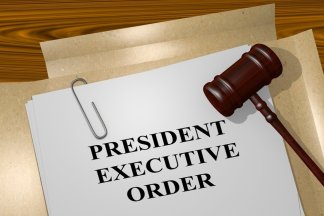New Executive Order and Possible Furloughs at USCIS
 The US President issued a new executive order on Monday evening. The order did several things. First, it extended the April 22, 2020 order limiting the ability for those overseas to get immigrant visas. Second, it expanded that order to include certain non-immigrant visas as well. Lastly, it required USCIS and DOL to review processes and procedures regarding EB-2 and EB-3 cases. Before providing a summary of the provisions, there are a couple points to highlight.
The US President issued a new executive order on Monday evening. The order did several things. First, it extended the April 22, 2020 order limiting the ability for those overseas to get immigrant visas. Second, it expanded that order to include certain non-immigrant visas as well. Lastly, it required USCIS and DOL to review processes and procedures regarding EB-2 and EB-3 cases. Before providing a summary of the provisions, there are a couple points to highlight.
First, and most importantly, the non-immigrant visa suspensions affect only those NOT IN THE United States. This is also true of the immigrant visa suspension. Second, the J-1 visa suspension does NOT include all categories of J visas. For example, the Research Scholar category, and the Visiting Scholar categories are NOT included in the suspension. Lastly, those outside the US with a currently VALID H-1B visa may still be able to return on that visa as the suspension only halts the issuance of new visas. Here is a slightly more expansive summary of the provisions:
On June 20, 2020, President Trump has issued a proclamation that suspends the entry of foreign nationals on certain employment-based nonimmigrant visas into the United States.
This Proclamation also extends, effective immediately, Presidential Proclamation 10014 issued on April 22, 2020 which suspended the entry of certain immigrants into the United States.
The Proclamation suspends the issuance of visas for those seeking entry pursuant to a(n):
- H-1B visa and any foreign national accompanying or following to join them;
- H-2B visa and any foreign national accompanying or following to join them;
- J visa, to the extent the foreign national is participating in an intern, trainee, teacher, camp counselor, au pair, or summer work travel program, and any foreign national accompanying or following to join them; and
- L visa, and any foreign national accompanying or following to join them.
The Proclamation will only apply to an individual identified above if they are:
- Outside the United States on the effective date of the Proclamation;
- Do not have a nonimmigrant visa that is valid on the effective date of the Proclamation; and;
- Do not have an official travel document other than a visa (such as a transportation letter, boarding foil, or advance parole document), valid on the effective date of the Proclamation or issued thereafter permitting the individual to be admitted to the United States.
Exemptions:
The Proclamation will not apply to the following individuals:
- lawful permanent residents;
- spouse or child of a U.S. citizen;
- any individual seeking entry to provide temporary labor essential to the U.S. food supply chain;
- any individual whose entry would be in the national interest as determined by the Secretary of State, the Secretary of Homeland Security, or their respective designees.
For the purposes of determining who is covered under the “national interest” exemption, the Proclamation directs the Secretaries of State, Labor, and Homeland Security to determine standards for those to whom such an exemption would be available, including any individuals who:
- are critical to the defense, law enforcement, diplomacy, or national security of the United States;
- are involved with the provision of medical care to individuals who have contracted COVID-19 and are currently hospitalized;
- are involved with the provision of medical research at U.S. facilities to help the United States combat COVID-19;
- are necessary to facilitate the immediate and continued economic recovery of the United States; or
- are children who would age out of eligibility for a visa because of this proclamation or Proclamation 10014.
Discretion: The consular officer has discretion to determine if an individual is within one of the exempted categories outlined above.
Asylum Seekers: Asylum seekers are not included in the ban. The Proclamation states that it does not limit the ability of individuals to apply for asylum, refugee status, withholding of removal or protection under the Convention Against Torture.
Fraud: Individuals who circumvent the application of the Proclamation through fraud, willful misrepresentation or illegal entry will be prioritized for removal.
Additional Review: Within 30 days of this Proclamation’s effective date, and every 60 days after, while it and Proclamation 10014 are in effect, the Secretary of Homeland Security, in consultation with the Secretaries of Labor and State will make a determination as to any need to modify either proclamation.
COVID-19 Prevention: The Secretary of Health and Human Services will provide guidance to the Secretaries of State and Homeland Security concerning measures that will reduce the risk of those seeking admission to the United States introducing or spreading COVID-19 within the country. It is our understanding that this means individuals will be subject to a COVID-19 test before arrival.
Additional Measures:
- Issue regulations or take additional actions to ensure that those who have already been admitted, or are seeking admission, on an EB-2 immigrant visa, EB-3 immigrant visa, or H-1B nonimmigrant visa do not limit opportunity for U.S. workers.
In addition to the above, USCIS announced that their revenues are down over 50% and that, unless Congress allocates more funding to the agency they will be required to furlough almost 70% of their staff, causing huge delays in adjudications if it were to occur.
If you have any questions, or wish to discuss the above, please do not hesitate to call or email me. And please remember, as always, this blog does not offer legal advice. If you need legal advice, consult with a lawyer instead of a blog. Thank you.